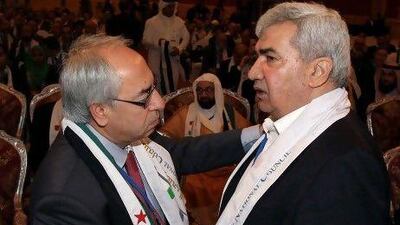The British prime minister, David Cameron, suggested yesterday that Syria's president could be allowed safe passage out of the country if that option would guarantee an end to the nation's civil war.
Mr Cameron said the international community should consider anything "to get that man out of the country and to have a safe transition in Syria".
He has previously called the failure of world powers to halt the assault by Bashar Al Assad's regime on its opponents a "terrible stain" on the reputation of the United Nations, where Syria's allies Russia and China have repeatedly blocked attempts to approve harsher sanctions.
"I am certainly not offering him an exit plan to Britain, but if he wants to leave, he could leave, that could be arranged," Mr Cameron told Al Arabiya television during his visit in Abu Dhabi.
The UN-Arab League envoy, Lakhdar Brahimi, in an interview with the London-based Al Hayat newspaper, played down the risk of sectarian and ethnic partition of Syria, but said: "What I am afraid of is ... that Syria turns into a new Somalia. I believe that if this issue is not dealt with correctly, the danger is 'Somalisation' and not partition: the collapse of the state and the emergence of warlords, militias and fighting groups."
The conflict is now stuck in a military stalemate, which rebel fighters blame on a lack of weapons, such as anti-aircraft missiles.
But Russia's foreign minister, Sergei Lavrov, said yesterday that rebels had obtained 50 Stinger shoulder-launched missiles.
"Those who are supplying arms to the opposition are delivering systems that are not intended for defence. There is confirmed information that on Syrian territory there are over 50 Stingers," he said.
Russia said last month that rebels had Stingers, but added it was not clear who had delivered the weapons. At the time the United States denied it had supplied the rebels with lethal weapons.
Mr Lavrov was speaking in Jordan's capital, Amman, yesterday after his meeting with Syria's defected former prime minister, Riad Hijab.
In the Qatari capital, Abdelbaset Saida, the head of the Syrian National Council (SNC), said that those trying to undermine his group were inadvertently prolonging the rule of Mr Al Assad. Mr Saida spoke at an SNC convention in Doha as the group tried to push back against US criticism and efforts to form a new opposition leadership that would likely sideline the SNC.
In Syria, 10 civilians were killed and at least 40 wounded in explosions in the western Damascus suburb of Qudsaya, the Syrian Observatory for Human Rights said.
Gunmen also shot and killed the brother of Syria's parliament speaker as he drove to work in Damascus yesterday, the state-run news agency reported.
Syrian rebels ambushed a military convoy in Idlib province, their stronghold in the north-west, killing at least 12 troops and wounding 20, the Observatory said.
Meanwhile, seven Syrian army generals also defected to Turkey to join opposition fighters, the Anatolia news agency reported.
* Agence France-Presse, Associated Press and Reuters

